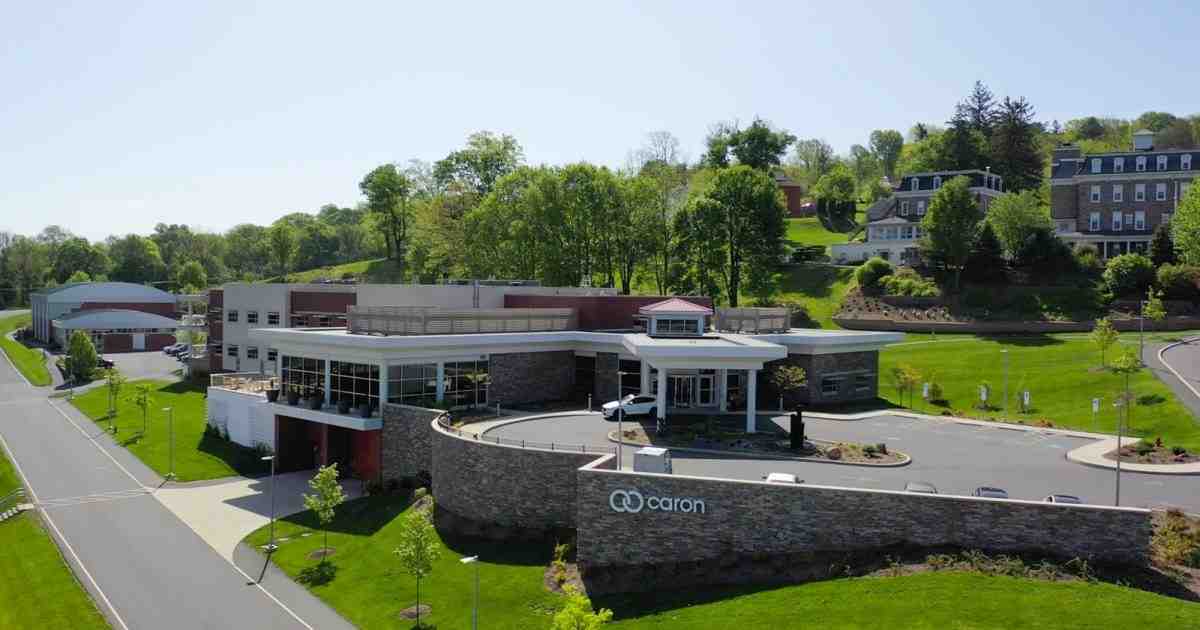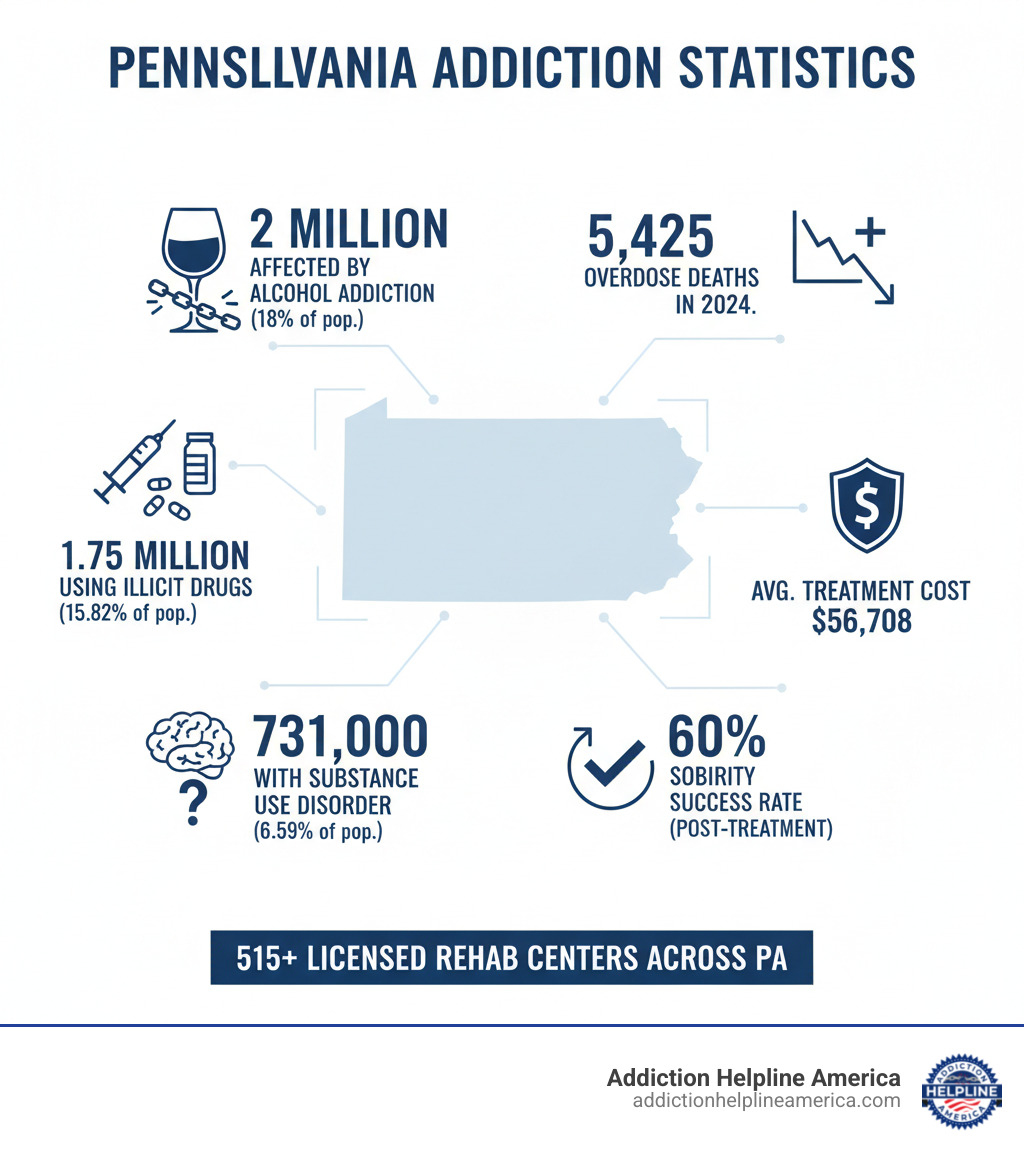
Why Finding the Right Drug Rehab Pennsylvania Facility Can Save Lives
Drug rehab Pennsylvania facilities offer a lifeline to the hundreds of thousands of people struggling with addiction in the state. If you or a loved one needs help, here’s what you need to know.
Quick Access to Pennsylvania Addiction Help:
- PA Get Help Now helpline: 1-800-662-HELP (4357) – Available 24/7
- Text support: 717-216-0905
- Average treatment cost: $56,708 total
- Treatment success rate: 60% maintain sobriety after completing a program
- Number of facilities: 515+ licensed treatment centers
The addiction crisis in Pennsylvania is severe, with over 5,425 overdose deaths in 2024. Nearly 2 million Pennsylvanians struggle with alcohol addiction, and 1.75 million use illicit drugs. The problem is growing, but so is access to quality treatment.
Finding the right rehab can feel overwhelming. You may worry about cost, time off work, or if treatment will even be effective. But the truth is: Recovery is possible, and treatment works. With the right support, most people can reclaim their lives from addiction.
At Addiction Helpline America, we connect individuals and families to effective drug rehab Pennsylvania facilities. Our specialists provide 24/7 confidential support to help you steer treatment options, verify insurance, and find accredited programs. We’re here to guide you through the first crucial step.
Drug rehab Pennsylvania terms at a glance:
- how to find a good rehab facility
- how to find rehab programs that accept insurance
- Drug treatment options
1. Use Trusted Pennsylvania Helplines and Resources
When you’re ready for help, knowing where to turn is the first step. Pennsylvania has a strong network of free, confidential helplines and resources designed to provide immediate support. You don’t have to figure this out alone; trained professionals are available to connect you with the right drug rehab Pennsylvania facilities.
Access Immediate Support 24/7
Pennsylvania makes getting help simple. The PA Get Help Now helpline at 1-800-662-HELP (4357) is available 24/7, including holidays. Real people answer these calls to provide immediate crisis support and answer questions about treatment. If you prefer not to talk, you can text 717-216-0905 or use the live chat option available through Addiction Helpline America’s contact options.
At Addiction Helpline America, we’re also here 24/7 to complement state resources. Our team specializes in helping you steer treatment options, verify insurance, and find accredited programs that match your specific situation.
Locate Licensed and Inspected Facilities
Finding a quality drug rehab Pennsylvania facility means looking for centers that meet strict state standards for safety and care. The Pennsylvania Department of Drug and Alcohol Programs (DDAP) oversees and inspects every licensed treatment facility in the state, ensuring you receive legitimate, safe care.
You can verify a facility’s credentials using several key resources:
- The Drug and Alcohol Facility Locator lets you search for licensed facilities and view their inspection results.
- The Treatment Atlas evaluates how well facilities use evidence-based practices, helping you find centers that offer proven therapies.
- Your local Single County Authority (SCA) is a county-level office that handles treatment funding, conducts assessments, and makes referrals in your area. They can provide personalized guidance and may help you access funding for treatment.
These tools help you make an informed decision. At Addiction Helpline America, we can help you interpret this information and find a drug rehab Pennsylvania center that truly fits your needs.
2. Evaluate Treatment Programs and Levels of Care
Addiction treatment is not one-size-fits-all. Every person’s struggle is unique, and the most effective drug rehab Pennsylvania centers offer a “continuum of care”—a range of treatment options with different intensity levels designed to meet you where you are in your recovery journey.
Understanding Different Program Types
Think of treatment levels as rungs on a ladder. The key is finding the right starting point and knowing you can move between levels as your needs change.
- Medical detox is often the first step, providing 24/7 medical supervision to safely manage withdrawal symptoms. This phase typically lasts 2-7 days.
- Inpatient or residential treatment is the highest level of care, where you live at the facility for 30, 60, or 90 days. This immersive environment removes you from daily triggers and surrounds you with 24/7 support.
- Partial hospitalization programs (PHP) are a step down, offering intensive treatment during the day while you return home or to a sober living residence at night.
- Intensive outpatient programs (IOP) provide flexibility for those with work or family responsibilities, with treatment several times a week for a few hours each session.
- Standard outpatient programs (OP) are the least intensive, usually involving weekly therapy sessions. This works well for milder issues or as a step-down from a higher level of care.
- Sober living homes are structured, drug-free residences where people in recovery live together, offering peer support and accountability as they transition back to independent living.
Here’s how inpatient and outpatient options compare:
| Feature | Inpatient/Residential Rehab | Outpatient Rehab (PHP, IOP, OP) |
|---|---|---|
| Structure | Highly structured, 24/7 supervision | Flexible, allows for work/school/family |
| Intensity | High, immersive therapy, group sessions, individual counseling | Moderate to low, regular therapy sessions |
| Cost | Higher (avg. $630.09/day without insurance) | Lower (avg. $56.87/day without insurance) |
| Environment | Live at facility, removed from daily triggers | Live at home, steer daily life while in treatment |
| Ideal Candidate | Severe addiction, co-occurring disorders, unstable home life | Milder addiction, strong support system, need for flexibility |
Key Components of a Comprehensive Treatment Plan
Quality drug rehab Pennsylvania facilities build their plans around several essential components to address addiction from multiple angles.
A thorough initial assessment is the first step, where professionals gather information about your substance use history, mental health, and personal circumstances to create a custom plan.
Personalized therapy is the core of treatment. This includes evidence-based approaches like Cognitive Behavioral Therapy (CBT) to change harmful thought patterns and Dialectical Behavior Therapy (DBT) to manage intense emotions and improve relationships.
Treatment plans typically include:
- Individual and group counseling: Individual sessions explore the root causes of addiction, while group sessions provide peer support and shared understanding.
- Family therapy: This helps repair damaged relationships, improve communication, and teach family members how to support recovery.
- Medication-assisted treatment (MAT): For opioid or alcohol addiction, MAT combines FDA-approved medications with counseling to reduce cravings and withdrawal symptoms, significantly improving outcomes.
- Life skills training: Practical education on topics like financial management, employment, and healthy relationships helps prepare you for a sustainable recovery.
- Aftercare planning: Before you leave, your team will create a detailed plan for ongoing support, including outpatient therapy, support groups, and relapse prevention strategies.
At Addiction Helpline America, we help you find programs that include all these essential components, giving you the best chance at lasting recovery.
3. Understand Costs and Insurance Coverage
Concerns about cost should not prevent you from seeking life-saving treatment. While the price tag for rehab can seem daunting, there are many ways to make it affordable. Treatment is an investment in your life, and help is more accessible than you might think.
Navigating the Costs of Drug Rehab Pennsylvania
The average cost for substance abuse treatment in Pennsylvania is around $56,708, but this number varies widely. Without insurance, inpatient treatment averages about $630 per day, while outpatient treatment is much more affordable at around $57 per day. However, very few people pay these full amounts out-of-pocket.
The final cost depends on several factors, including the type of facility (standard vs. luxury), the length of your stay, and whether you require specialized programs. While 30-day programs are common, research shows that 60 to 90-day stays often lead to better long-term outcomes.
How Insurance and Other Funding Works
Thanks to mental health parity laws, most insurance plans are required to cover addiction treatment. Your policy likely covers more than you realize.
Verifying your benefits is the critical first step. The admissions team at a prospective drug rehab Pennsylvania facility can do this for you for free. At Addiction Helpline America, we offer this service to help you understand your deductible, co-pay, and out-of-pocket maximum. Most Pennsylvania rehabs accept major providers like BlueCross BlueShield, Aetna, Cigna, UPMC Health Plan, and Highmark.
Your costs will also depend on whether a facility is in-network (lower cost) or out-of-network (higher cost) with your insurance plan. If you have Medicaid or Medicare, numerous facilities in Pennsylvania accept these plans.
If you are uninsured or underinsured, other options are available:
- Pennsylvania’s Single County Authorities (SCAs) provide treatment funding and referrals.
- Many facilities offer payment plans or sliding scale fees based on your income.
- Private financing through healthcare lenders can provide manageable monthly payments.
- Some nonprofit organizations offer scholarships or grants.
At Addiction Helpline America, we help people steer these financial options every day. Don’t let money be the reason you don’t get help.
4. Find Accredited and Specialized Drug Rehab Pennsylvania Centers
Finding a quality drug rehab Pennsylvania facility means looking beyond a fancy website. It’s about choosing a center that offers proven, effective care custom to your specific situation. This is where accreditation and specialized programs are crucial.
The Importance of Accreditation and Ratings
Accreditation is a seal of approval from expert organizations, signifying that a facility meets high standards for quality, safety, and patient care. Look for accreditation from bodies like The Joint Commission (Gold Seal of Approval) and CARF (Commission on Accreditation of Rehabilitation Facilities). Other marks of quality include alignment with guidelines from SAMHSA and membership in NAATP.
Beyond official accreditation, patient ratings and reviews on platforms like Google offer real-world insight. Consistently high ratings (4.5 stars or more) often indicate a facility’s commitment to patient well-being. Additionally, the Treatment Atlas is an invaluable tool that evaluates facilities on their use of evidence-based best practices, helping you focus on what truly works.
Finding the Right Specialized Drug Rehab Pennsylvania Program
Addiction rarely exists in a vacuum. Many people also face mental health challenges or unique life circumstances that require a specialized approach. Finding the right program can make all the difference.
- Dual diagnosis/co-occurring disorder programs treat both substance use and mental health conditions like depression, anxiety, or PTSD simultaneously.
- LGBTQ+ affirming care provides a safe, inclusive environment where individuals can feel understood and supported.
- Veterans programs address the specific traumas and challenges faced by those who have served in the military, often offering trauma-informed care and peer support.
- Gender-specific treatment allows men or women to focus on recovery without the social dynamics of a mixed-gender setting, addressing gender-specific pressures and issues.
- Age-specific programs cater to the unique needs of adolescents, young adults, or seniors, addressing challenges relevant to their stage of life.
- Other specialized programs may address issues like compulsive gambling, which requires specific coping strategies.
When exploring drug rehab Pennsylvania options, ask about specialized programs that fit your background. This targeted approach can significantly improve treatment effectiveness. At Addiction Helpline America, we can help you identify which programs might benefit you most.
5. Consider Local Treatment and Family Involvement
Recovery doesn’t happen in a bubble. Your community and family play a powerful role in your healing. When searching for drug rehab Pennsylvania options, consider how proximity to home and family involvement can build a stronger foundation for recovery.
The Benefits of Choosing a Rehab Close to Home
Choosing a local treatment center offers several advantages for long-term success:
- Reduced Travel Stress: Staying local eliminates the stress and expense of long-distance travel, allowing you to focus your energy on recovery.
- Easier Family Participation: Proximity makes it easier for loved ones to attend family therapy, workshops, and visits, turning them into active partners in your recovery.
- Established Local Support: You can build connections with local therapists and support groups (like AA/NA) while still in treatment, creating a network that will be there for you when you transition home.
- Smoother Transition: Learning recovery skills in the same community where you’ll apply them makes the transition back to daily life less jarring.
How Family Members Can Support the Recovery Journey
Addiction affects the entire family, and so does healing. Most drug rehab Pennsylvania centers integrate family support directly into their programs. Family members can help by:
- Participating in family therapy: These sessions provide a safe space to improve communication, resolve conflicts, and rebuild trust.
- Attending educational workshops: Learning about the science of addiction and enabling behaviors empowers families to provide effective support.
- Joining support groups: Groups like Al-Anon and Nar-Anon offer a recovery community for family members to share experiences and find their own healing.
- Setting healthy boundaries: Treatment helps families learn the difference between supporting recovery and enabling addiction.
- Creating a supportive home environment: This involves building new, healthy family patterns centered on open communication, accountability, and grace.
At Addiction Helpline America, we’ve seen how engaged families can be the secret ingredient to lasting recovery. It’s a team effort, and you don’t have to do it alone.
Frequently Asked Questions about Addiction Treatment in PA
When you’re considering drug rehab Pennsylvania options, it’s natural to have questions. Here are answers to some of the most common concerns we hear.
How long does drug rehab in Pennsylvania typically last?
The length of treatment varies based on the individual’s needs, the substances involved, and the severity of the addiction. Treatment often begins with a detox phase of 2 to 7 days to manage withdrawal safely.
After detox, inpatient or residential programs typically last 30, 60, or 90 days. Research consistently shows that longer stays—particularly 90 days—lead to better long-term outcomes by providing more time to build solid recovery skills. Outpatient programs can last from several weeks to several months, with decreasing intensity over time. Sticking with the full recommended program length gives you the best chance at sustained sobriety.
What should I look for in the staff at a treatment center?
The quality of the staff is critical to your recovery experience. Look for a drug rehab Pennsylvania facility with:
- Licensed Professionals: The team should include medical doctors, licensed professional counselors (LPCs), licensed clinical social workers (LCSWs), and certified addiction counselors.
- Compassionate Care: Beyond credentials, you want staff who are respectful, empathetic, and accessible.
- Personal Recovery Experience: Many find it helpful to be guided by staff who have personal experience with recovery and can offer hope from their own journey.
- A Multidisciplinary Team: The best facilities have a diverse team of therapists, doctors, and case managers to address your physical, mental, and emotional needs.
Can I lose my job for going to rehab?
No, federal laws protect your job while you seek treatment for a substance use disorder.
The Family and Medical Leave Act (FMLA) allows eligible employees to take up to 12 weeks of unpaid, job-protected leave for medical reasons, including addiction treatment. This means your job or an equivalent position must be held for you.
The Americans with Disabilities Act (ADA) also offers protection, classifying a person in recovery from a substance use disorder as having a disability. This prevents employers from discriminating against you for seeking help.
Your medical information is protected by strict confidentiality laws (HIPAA). While it’s often wise to speak with your HR department, you are not required to disclose the specifics of your medical leave. Your recovery is too important to let job fears stand in the way.
Take the First Step Towards Recovery Today
The path to recovery is one of the most important journeys you’ll ever take. This guide has shown you how to find effective drug rehab Pennsylvania facilities by using trusted resources, evaluating programs, understanding costs, finding accredited centers, and involving your family.
What matters most is this: Recovery is absolutely possible. Statistics show that 60% of people who complete treatment maintain their sobriety. These are not just numbers; they are people who have reclaimed their lives.
If you are reading this, you have already taken a courageous step. But information alone isn’t enough. The time to act is now.
At Addiction Helpline America, we make getting help simple. Our team of addiction specialists provides free, confidential, and personalized guidance 24/7. We will help you verify your insurance, understand your options, and connect with an accredited program in Pennsylvania that fits your unique needs.
You don’t have to do this alone. We are here to walk beside you and guide you toward the right treatment.
Whether you’re seeking help for yourself or a loved one, we’re ready to help you find a rehab center in Pennsylvania that fits your needs. Your story doesn’t end with addiction—it begins with recovery.
Our helpline is 100%
free & confidential
If you or someone you care about is struggling with drug or alcohol addiction, we can help you explore your recovery options. Don’t face this challenge alone—seek support from us.
Programs
Resources
Will my insurance
cover addiction
treatment?
We're ready to help
Find the best
drug or alcohol treatment
center
Are you or a loved one struggling with addiction? Call today to speak to a treatment expert.
















